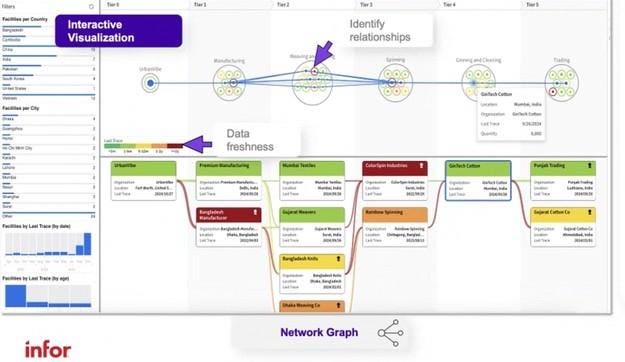Digital Product Passports: Navigating the Future of Compliance and Transparency
The global business landscape is undergoing a significant transformation, driven by escalating regulations concerning product safety, sustainability, and ethical sourcing. In this evolving environment, Digital Product Passports (DPPs) are emerging as a crucial tool for companies to navigate these complex challenges. DPPs offer a streamlined, digital solution for documenting a product’s entire lifecycle, from origin to disposal, enabling businesses to demonstrate compliance, foster transparency, and build trust with consumers and regulatory bodies. For companies operating internationally, the ability to access accurate and comprehensive product information rapidly can be instrumental in avoiding penalties and maintaining a positive brand reputation.
Compliance Landscape and the Urgency of DPPs
Several regulations are driving the adoption of DPPs, with some mandating their use and others encouraging their implementation as a more effective compliance solution. The Uygher Forced Labor Protection Act (UFLPA), enacted in the United States, prohibits the importation of goods produced with forced labor. Enforcement of the UFLPA has been stringent, resulting in numerous shipment detentions and denials of entry, highlighting the complexity of compliance. DPPs offer a robust mechanism for demonstrating compliance by providing verifiable evidence of a product’s origin and manufacturing processes. The European Union is also poised to introduce regulations mandating the use of DPPs for a wide range of products. The EU Digital Product Passport initiative aims to enhance transparency across value chains by providing detailed information on a product’s origin, materials, environmental impact, and disposal recommendations. This move is designed to address the growing consumer demand for product transparency and bridge the gap between consumer expectations and the current lack of reliable product information. Further, DPPs can assist companies in preparing for regulations such as the Corporate Sustainability Due Diligence Directive (CSDDD), which aims to hold large corporations accountable for human rights and environmental impacts within their operations and supply chains.
Infor’s Approach to Digital Product Passports: Addressing the Complexity of Traceability
While the timelines for these regulations remain subject to change, the underlying trend toward increased transparency and accountability is undeniable. Companies like Infor are recognizing this shift and developing solutions to meet the evolving needs of businesses. Infor’s Map and Trace solution empowers businesses to map their supply chains and gather documentation from multiple supplier tiers, providing critical evidence of compliance with regulations like the UFLPA. However, the dynamic nature of supply chains, with frequent changes in suppliers and sourcing practices, necessitates a more proactive and comprehensive approach to traceability. Infor’s NexTrace, a dedicated DPP solution, addresses this challenge by proactively collecting item-level traceability data from every tier of the supply chain. This comprehensive approach involves gathering vast amounts of data, including bills of lading, ERP data (bill of materials), warehouse management system data, and manufacturing execution system data, from all nodes in the supply chain.
Harnessing Technology for Scalable Traceability and Data Integration
The complexity of gathering and integrating this data is further compounded by variations in nomenclature used by suppliers and buyers. NexTrace overcomes this obstacle by leveraging generative AI and large language models to standardize data and ensure consistency across the supply chain. This automated approach streamlines the process and minimizes the need for manual intervention, enabling scalable data collection and analysis. The collected traceability information is then transformed into a usable format for compliance authorities, such as chain of custody diagrams, providing a clear and comprehensive view of the product’s journey through the supply chain. This information is made accessible through a centralized platform, ensuring that companies can readily access and share the required data with regulatory bodies and other stakeholders.
The Role of Multi-Enterprise Supply Chain Networks
Infor’s NexTrace distinguishes itself by addressing the crucial challenge of proving the provenance of every actor in the end-to-end supply chain for each product. This granular level of traceability is essential for meeting the stringent requirements of regulations like the UFLPA and building trust with consumers. The solution leverages the Infor Nexus multi-enterprise supply chain network (MESCN) platform, providing the scalability and collaborative capabilities needed to manage the massive data flows associated with a holistic DPP solution. While other technologies like blockchain are often touted for their potential in supply chain traceability, their computational intensity limits their ability to handle the scale of data required for a comprehensive DPP solution.
The Future of Digital Product Passports and Supply Chain Transparency
The market for digital product passport solutions is expected to grow rapidly as companies seek to address the increasing demands for transparency and compliance. While a variety of solution providers, including ESG solution suppliers and consumer tag makers, will play a role in the evolving DPP ecosystem, solutions like NexTrace offer a comprehensive approach by tackling the complex challenge of end-to-end supply chain traceability. The future of DPPs lies in collaborative, multi-enterprise platforms that can effectively manage the massive data flows and provide the granular level of traceability required to meet regulatory requirements and build consumer trust. As the regulatory landscape continues to evolve, DPPs will become an integral part of the supply chain management process, enabling companies to navigate the complexities of compliance, enhance transparency, and contribute to a more sustainable and ethical global marketplace. The adoption of DPPs represents a significant step forward in creating a more responsible and accountable global supply chain.



